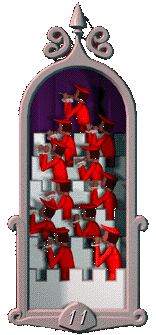 Today it begins, our ninth annual “Twitcast” joining pro-life bloggers from near and far, who all had the good sense once again, to come in out of the cold during the annual March For Life, for this year's ProLifeCon, the “premiere conference for the online prolife community” hosted once again by the Family Research Council in Washington DC.
Today it begins, our ninth annual “Twitcast” joining pro-life bloggers from near and far, who all had the good sense once again, to come in out of the cold during the annual March For Life, for this year's ProLifeCon, the “premiere conference for the online prolife community” hosted once again by the Family Research Council in Washington DC. During the event, this video clip provided a live feed of the proceedings. With its conclusion, you are invited to view the full pre-recording (which is not accessible on all browsers; no to Safari, yes to Chrome). You can learn more at the FRC website, follow the magic hashtag on Twitter: #prolifecon, or follow yours truly at: twitter.com/manwithblackhat.
+ + +
The list of speakers announced two days prior to the event (not necessarily in order of appearance) are as follows:
Rep Marsha Blackburn (R-TN)
Senator Steve Daines (R-MT)
Ryan Bomberger, Founder, The Radiance Foundation
David Daleiden, Founder, Center for Medical Progress
Lyndsey Fifield, Social Media Manager, The Heritage Foundation
Senator Lindsey Graham (R-SC)
Anna Hoduski, Campaign Speaker & Runner, Project If Life
Leah Jacobson, Founder, The Guiding Star Project
Abby Johnson, CEO and Founder, And Then There Were None
Brynne Krispin, Social Media Manager, Family Research Council
Andrew Moore, Digital and Creative Director, SBA List
Sarah Perry, Coalition Coordinator, FRC Action
Rep Cathy McMorris Rodgers (R-WA)
Lila Rose, President, Live Action
David Scotton, Producer, I Lived on Parker Avenue
Missy Stone, Spokesperson, Students for Life of America
+ + +
Okay, boys and girls. The annual Twitcast for the 2018 #ProLifeCon will begin shortly, courtesy of @FRCdc, for the ninth year in a row. Stay tuned ...
8:19am
Our annual Twitcast is a proud participant in the #MarchForLife2018, but for the presence of mind to remain indoors and not freeze to death. #ProLifeCon
8:23am
"Thirty seconds, everyone." #ProLifeCon
8:29am
And so it begins. #ProLifeCon
8:30am
Sarah Perry introduces the event. #ProLifeCon
8:30am
Rep Cathy McMorris Rodgers (R-WA) #ProLifeCon
8:32am
Talking about her kids. Who can blame her? #ProLifeCon
8:34am
"Kids beating the odds remind us that every life is a precious gift." #ProLifeCon
8:34am
The House is considering legislation to protect babies born alive after a failed abortion. #ProLifeCon
8:35am
"How do we get past us versus them?" #ProLifeCon
8:36am
"The shortest distance between two people is their stories.” #ProLifeCon
8:36am
Answering questions about impending legislation. #ProLifeCon
8:39am
Rep Marsha Blackburn (R-TN) #ProLifeCon
8:40am
Actions are being taken against abortion clinics and third-party sellers acting outside the law. #ProLifeCon
8:42am
The Department of Justice and the FBI have confirmed 15 criminal referrals. #ProLifeCon
8:44am
Planned Parenthood is now under federal investigation by the FBI and Attorneys General of a number of States. #ProLifeCon
8:45am
The Abortion Survivors Act is for both mothers and babies who survive a failed abortion and holds medical providers accountable, with criminal penalties for the latter who do not comply. #ProLifeCon
8:47am
NOTA BENE: This annual Twitcast is now available with 280 characters for each message. Twice the letters, twice the action! #ProLifeCon
8:48am
Ryan Bomberger, Founder, The Radiance Foundation (a "man with black hat" favorite). #ProLifeCon
8:50am
"Factophobia" is the fear of facts. #ProLifeCon
8:52am
"Truth ain't hate. Let love illuminate." #ProLifeCon
8:52am
"Factivist." #ProLifeCon
8:53am
There are forces in the United Nations attempting to make abortion a "human right." #ProLifeCon
8:55am
"Birth control is ... the weeding out of the unfit ..." - Margaret Sanger #ProLifeCon
8:58am
Mainstream media misleads the public on the extent of Planned Parenthood's percentage of abortion services when compared to other services they claim to provide (but are doing less with every year). #ProLifeCon
9:02am
"Half a billion dollars to an unaccountable organization." #ProLifeCon
9:03am
Margaret Sanger was a pioneer in the field of eugenics, and she is still praised today. Crickets from the media. #ProLifeCon
9:04am
Abortion has a huge and disproportionate impact on the Black community. #ProLifeCon
9:04am
"As "factivists," we can circumvent mainstream media." #ProLifeCon
9:06am
Billboard: "Abortion is systemic racism." #ProLifeCon
9:07am
Patrina Mosley of FRC is out on the Mall. No one else is ... yet. #ProLifeCon
9:09am
Abby Johnson, CEO and Founder, And Then There Were None #ProLifeCon
9:10am
"Some bios say I have five children, I actually have seven." #ProLifeCon
9:11am
"We have helped 419 people leave the abortion industry." #ProLifeCon
9:11am
"Choose life, so that you and your children may live." - Book of Proverbs #ProLifeCon
9:12am
"The pro-choice movement doesn't have to masquerade as pro-lifers to sabotage the movement, we have enough of our own to do that." #ProLifeCon
9:14am
"People (and the pro-choice movement) are watching you." #ProLifeCon
9:15am
Blaming the mother for poor choices and lack of self-restraint (or calling them "baby killers") is counter-productive. #ProLifeCon
9:16am
"I prayed every day that I might be able to speak to some of these women, that there were some of us who genuinely cared about them." #ProLifeCon
9:18am
After three years of writing letters to these women, finally got a response. #ProLifeCon
9:19am
"She was seeing what you were writing, and was looking for a sign of hope." #ProLifeCon
9:21am
"We are pro-life, but we must also be pro-love. People are watching. Choose well." #ProLifeCon
9:22am
David Daleiden, Founder, Center for Medical Progress #ProLifeCon
9:23am
(Dude, is this thing on?) #ProLifeCon
9:24am
Planned Parenthood has violated federal law with the documented harvesting of vital organs of the unborn for sale and profit. #ProLifeCon
9:26am
Two partnering companies with PP in Orange County, CA, have pleaded guilty. #ProLifeCon
9:28am
Half the undercover video footage have yet to come to light due to a court-imposed gag order. The truth will come out. #ProLifeCon
9:30am
centerformedicalprogress.org #ProLifeCon
9:33am
cmp.org #ProLifeCon
9:35am
Anna Hoduski, Campaign Speaker & Runner, Project If Life #ProLifeCon
9:36am
projectif.life #ProLifeCon
9:40am
Shares experience of running across America, including the deserts of southern California. #ProLifeCon
9:41am
"Don't be discouraged about the times of the deserts in your life." #ProLifeCon
9:43am
Back to our correspondent Patrina Mosley at the Mall. There is now a crowd, at least around her, from Arizona and Tennessee. #ProLifeCon
9:46am
INTERMISSION #ProLifeCon
9:47am
And ... we're back! #ProLifeCon
9:59am
“Using Social Media to Advance a Culture of Life” Panel with three guests. #ProLifeCon
10:00am
1. Brynne Krispin, Social Media Manager, Family Research Council (Moderator)
2. Andrew Moore, Digital and Creative Director, SBA List
3. Lyndsey Fifield, Social Media Manager, The Heritage Foundation #ProLifeCon
10:01am
Use of social media platforms such as Twitter. #ProLifeCon
10:04am
With the use of Facebook, the power is back to the individual (at the @Heritage Foundation). #ProLifeCon
10:05am
Putting out an advertisement on Twitter, the conversation remains on Twitter. #ProLifeCon
10:08am
Still having problems with blocked content (because it's "sensitive"). Screenshots of the suppression are encouraged. #ProLifeCon
10:09am
"Our facts about Planned Parenthood are coming from their own annual reports." #ProLifeCon
10:11am
"The younger generation can see the details in the sonograms, and that is very powerful." #ProLifeCon
10:17am
Beyonce showed her unborn child as a sonogram on Instagram. "How cool is that?" #ProLifeCon
10:19am
Leah Jacobson, Founder, The Guiding Star Project #ProLifeCon
10:22am
theguidingstarproject.com #ProLifeCon
10:23am
"I didn't set out to do pro-life work. Young women who found themselves pregnant would approach me on campus, with questions about what they didn't know?" #ProLifeCon
10:24am
"We believe in a model of holistic women's health care." #ProLifeCon
10:25am
"Wholistic Women's Healthcare" provides complete women's health care from the time just prior to the first onset of menses. #ProLifeCon
10:27am
"We do not reduce women to their reproductive body parts. That is a narrow and self-destructive outlook." #ProLifeCon
10:29am
Available on Facebook and Twitter. #ProLifeCon
10:30am
Missy Stone, Spokesperson, Students for Life of America #ProLifeCon
10:31am
"I worked with a lot of students around the country on a personal level." #ProLifeCon
10:31am
A young lady who was pregnant asked a student leader: "Aren't pro-life people supposed to help?" #ProLifeCon
10:32am
It used to be "click and send and I'm done," but social media has become more engaging. #ProLifeCon
10:34am
"Being where they are, showing them what is happening, and getting them involved." #ProLifeCon
10:35am
More activists are using Snapchat. #ProLifeCon
10:37am
"One of our messages with young audiences is, for example, 'Planned Parenthood, go fund yourself.'" #ProLifeCon
10:38am
"We can't be afraid of the comments section. We're going to be honest about pro-life issues." #ProLifeCon
10:42am
Senator Steve Daines (R-MT) #ProLifeCon
10:43am
"If you want to know a lawmaker's true pro-life views, ask their wife what theirs is. That's very wise advice." #ProLifeCon
10:44am
"You're only as happy as your unhappiest child. You feel the pain with the child." #ProLifeCon
10:47am
"At twenty weeks, a baby feels pain." #ProLifeCon
10:47am
As a chemical engineer with Procter and Gamble, a personal donation of a box of shampoo saved a baby's life. #ProLifeCon
10:51am
From the Gospel of Luke: "When Elizabeth greeted Mary, the baby lept in her womb, and Elizabeth cried out with joy." #ProLifeCon
10:53am
He told his colleagues to just Google "20 weeks" on the floor of the US Senate. #20Weeks #ProLifeCon
10:55am
Sen Lindsey Graham (R-SC) #ProLifeCon
10:57am
Author of the "Pain-Capable Unborn Child Protection Act" on the floor of the Senate. #ProLifeCon
10:58am
"I don't think we're gonna get sixty [votes], but we're gonna get over fifty." #ProLifeCon
10:58am
Seven countries allow abortion on demand at 20 weeks. #ProLifeCon
10:59am
"Remember the partial-birth abortion debate?" #ProLifeCon
11:01am
"Laws against partial-birth abortion because of people like you." #ProLifeCon
11:02am
"This [bill] is the centerpiece of the pro-life movement. Our time is now." #ProLifeCon
11:04am
David Scotton, Producer, I Lived on Parker Avenue #ProLifeCon
11:04am
ILivedOnParkerAvenue.com #ProLifeCon
11:06am
The mother was told by a sidewalk protester that "your baby has ten fingers and ten toes." Scotton was that baby 24 years ago, and is now sharing the truth about "the adoption option." #ProLifeCon
11:09am
Lila Rose, President, Live Action @LilaGraceRose #ProLifeCon
11:12am
"Abortion advocates paint this as a positive thing. But women don't walk into an abortion clinic because they feel powerful, but because they feel powerless. This is what actually happens in an abortion clinic." #ProLifeCon
11:18am
Pro-choicers encountered on the street in Berkeley(!!!) were shown a video of an abortion procedure. They were interviewed both before and after. #ProLifeCon
11:24am
AbortionProcedures.com #ProLifeCon
11:24am
Tony Perkins of FRC: "We are closer than ever to defunding Planned Parenthood." #ProLifeCon
11:28am
@LilaGraceRose receives this year's Digital Pro-Life Pioneer Award. #ProLifeCon
11:28am
"Thank you for being a part of this." - Tony Perkins, FRC #ProLifeCon
11:29am
Sarah Perry: "Let's go March. See you soon." #ProLifeCon
11:30am
And ... we're out! #ProLifeCon
11:30am
Thanks to all who followed our annual “Twitcast,” and a special welcome to 7 new followers. Catch the complete summation at manwithblackhat.blogspot.com. #ProLifeCon
11:31am
+ + +

















